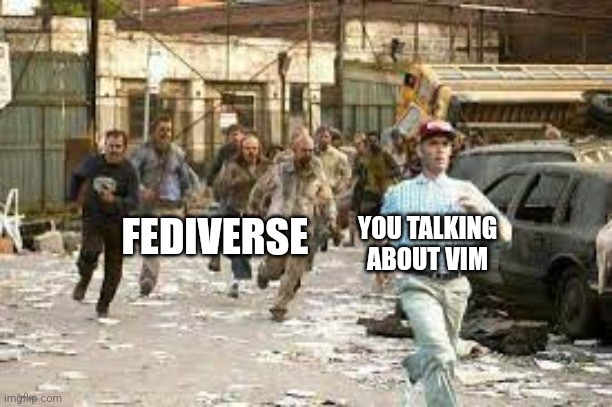nvim superiority
Programmer Humor
Post funny things about programming here! (Or just rant about your favourite programming language.)
Rules:
- Posts must be relevant to programming, programmers, or computer science.
- No NSFW content.
- Jokes must be in good taste. No hate speech, bigotry, etc.
Nvim gang
Just bc vim is superior? (/s :-P)
What's that at the end of your comment? Is that how you close vim??
You don't ever close vim. You pray to the gods and hope that vim chooses to quit for you. (technically accurate if you think about it - i.e. otherwise you leave swap files all over the place:-P)
And hope that you do not mess up and summon a daemon instead:-P.
If an IDE doesn't have vi key bindings it isn't going to be used by me. That's what finally get me to change from terminal only dev to vscode. Until I found the vi editing extension the IDE wasn't of interest.
Yes, vi is just that good.
I hear emacs bindings are also great, but I just know how to save and exit from emacs.
I use doom emacs and have to say, it takes everything that I like about vim and adds to emacs, plus a lot of useful features that i would have to install myself otherwise that can be enable by just uncommenting a feel lines in the config file.
It's can feel a bit bloated at first but allows me to have the perfect IDE (for me at least) in a matter of minutes.
And the best of all is that I don't need to use the emacs keybinds if I don't wanna (and I don't).
One of the interesting aspects of humanity is how much people like given text editing methods. There's a handful of approaches and after learning one or two, people really figure out what works for them.
I am more than happy to say I like vim, but in the end you should use what you like best. Just done be surprised when I can write and edit a ton of text really fast while your nano session is comfortable, but slow.
If you try emacs again, try evil mode. It adds vi bindings.
Emacs keybinds are fine, used them for some years. But once I tried modal bindings I never wanted to go back, "key-chords" just add strain.
Fortunately emacs has many options for modal keybindings, I prefer meow over vim personally
I use nano :-P
Go sit in a corner and think about what you've done
I will and I will exit nano easily

Ctrl+X -> Enter

You have to say you use Vim then actually use Nano. That's the Linux way.
They’re racing to be the first to make a joke about being hard to quit.
This is bound to be an unpopular opinion here but I hate vim.
Shortcuts in vim make no sense whatsoever. They’re not the fastest possible shortcuts nor are they intuitive.
Sure it’s got useful features if you let the awful design brow beat you into memorising an absurd number of shortcuts that lack any form of logic.
You could have a cheat sheet on another monitor but at that point why not have an editor that has a gui.
The reason is b/c vim predates GUIs. Yes, as in all of them:-D. (Or rather, its predecessor vi did and vim unlike others very much remained true to its origins)
Even now, there are many places e.g. when doing server maintenance or accessing a compute cluster via SSH, sometimes you do not have a handy GUI environment accessible, at which point your choices become extremely limited, and it helps that vim has been installed on every Unix-i/Linux-ish machine since the 80s.
GUIs are superior, ofc, when they work. On a daily basis I even use a GUI for vim - MacVim (for Windows there used to be Cream but I am very out of date there), and there is always gVim. I could use something else but I am familiar with vim and it is EXTREMELY powerful - e.g. I could indent 100,000 lines in the middle of a file without having to manually select all of them at once first, or better still only do the indentation based on matching a pattern.
It is very advanced, and thus not for everyone, and even those of us that use it often prefer the GUI way for simple tasks like select a contiguous block of 5 lines, but it offers the benefit that it works in the widest possible number of scenarios - e.g. more than nano. emacs does too, except its commands are so configurable that the X-windows GUI number 1, X-windows GUI number 2, and command-line versions all use entirely different shortcuts, so a cheat sheet would not help. vim offers consistency that, afaik, is absolutely unmatched anywhere.
Now you know:-).
Even when Emacs had two GUI versions, the default keys were pretty much the same between them, as far as I recall, excepting features missing from one or the other. For a very long time now, it's all been reconciled as GNU Emacs, anyhow, whether CLI or XWin GUI, or even on a Mac or (shudder) MS Windows. I just use my local running Emacs, with my preferred configuration, to edit files anywhere, such as inside a running container on a remote server in AWS, so it's pretty consistent for me.
I was shoved into Linux by a nearly dead HPC expert who was definitely angry about the advent of electricity.
Wasn't given any indication of a text editor, I ran across vim for one reason or another and enjoyed his Palpatine-like reaction from seeing me using vim enough to keep using it. And if you're enjoying something, why not
But yeah, it has some drawbacks lol
Having a mentor like this is unfathomably valuable. The kind that knows exactly when a printer problem should be fixed with a sledgehammer and are not afraid to apply the “fix”.
You can change shortcuts
I used to use a lot of nvim but actually went to Jetbrains now at work... It's just a lot easier to work with for teams.
I only use nano
helix is superior

..but soon hopefully, already my second in command alongside VSCodium
Neovim is the pinnacle of editing. I have seen the light.
Vim actually has a surprising ammount of features already built in, you don't even really need any Plugins. It has a file browser, terminal emulator, and window tiling built in
I like helix more :3
Helix is great except when you switch to vim for whatever reason and everything is backwards
Someone here will know—why shouldn’t I use nano.
If it works for you. Go ahead
But I must be stopped!
Why? What's wrong with your nano usage? Is it becoming a problem?
Ever since I left VI, I just haven’t felt the same. My nano has definitely persisted for more than 4 hours.
